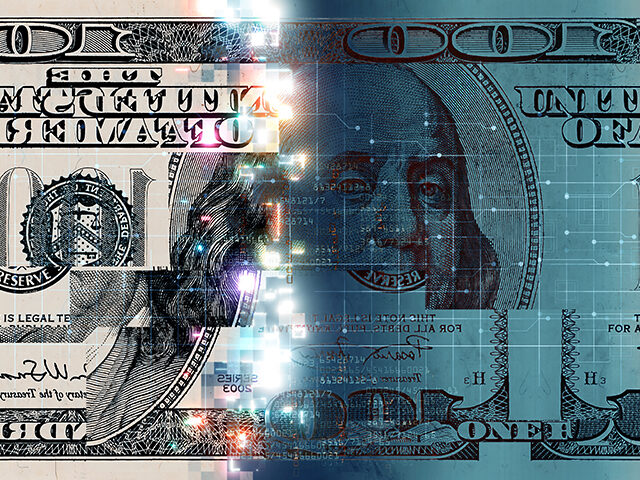Now, on the other side of the aisle are freedom-loving Americans fighting against this CBDC like Rep. Tom Emmer (R-MN).
- February 2023, Emmer introduced the CBDC Anti-Surveillance State Act to halt efforts of unelected bureaucrats in Washington, D.C., from issuing a central bank digital currency (CBDC), which Emmer said “strips Americans of their right to financial privacy” and is “a dangerous surveillance tool.”
- Rep. Byron Donalds (R-FL) says, “CBDCs pose a clear threat to Americans’ financial independence.”
- Rep. Barry Loudermilk (R-GA) says, “The Federal Reserve’s push to develop a central bank digital currency would allow the Fed to track an individual’s transactions indefinitely.”
What Will America Look Like When Joe Biden’s Central Bank Digital Currency Becomes a Reality?

The following content is sponsored by Monetary Gold.
Before we dive into the details, it’s important to understand what exactly constitutes a Central Bank Digital Currency or CBDC.
A Central Bank Digital Currency (CBDC) is a digital form of a country’s national currency issued by its central bank. Unlike traditional physical money such as banknotes and coins, CBDCs exist in electronic or digital form.
CBDCs are distinct from cryptocurrencies like Bitcoin, as they are typically issued and regulated by a central authority, such as the central bank or federal government. The central bank oversees the creation, distribution, and regulation of the CBDC.
Is a Central Bank Digital Currency good for the federal government or our people?
Former President Donald Trump warned that a Central Bank Digital Currency (CBDC) or a Fed-controlled Digital Dollar “would give our federal Government absolute control over your money.”
“They could take your money, and you wouldn’t even know it’s gone.
This would be a dangerous threat to our freedom.”
Are there any cases where countries have introduced a CBDC while maintaining control over their citizen’s financial resources?
Christine Lagarde, head of the European Central Bank, admitted that the purpose of CBDCs, like the digital euro, is control. She also noted that those who pay more than 1,000 EUR in cash for any transaction are doing so off the grid and will be fined or go to jail.
Whoa, using your own cash for private transactions over 1,000 EUR in the European Union will send you to jail? That’s a pretty scary thought.
Are there any reports as to how China is using its CBDC?
Wired magazine reports that “China’s Digital Yuan Works Just Like Cash—With Added Surveillance.”
Back in January 2021, a Forbes article had the headline: “China’s Digital Yuan Reported To Be the Ultimate Financial Censorship Tool.”
Rep. Mike Flood (R-NE) told reporters that “The Chinese Communist Party’s move to use government-run digital currency to impose further control on its people and its economy is a cautionary tale that America must avoid.”
On one side of the aisle, we have those in our government who are in favor of a CBDC.
Treasury Secretary Janet Yellen and Federal Reserve Chairman Jerome Powell hinted (in a February 22, 2021, virtual conference hosted by the New York Times) that a digital dollar is a high-priority project for the U.S.
In fact, the Federal Reserve announced in August 2020 that the central bank had partnered with the Massachusetts Institute of Technology researchers to build and test a digital currency.
- Legal surveillance of U.S. citizens
- Control of all bank accounts and purchases
- The ability to crush free speech and silence opposing voices
Then we have Sen. Sherrod Brown’s (D-OH) pro-digital dollar draft—Senate Bill 3571—Banking for All Act. It describes Federal Digital Wallets.
Now, to add icing to the cake, Sen. Elizabeth Warren (D-MA), along with Sens. Joe Manchin (D-WV) and Lindsey Graham (R-SC), introduced legislation to abolish digital money privacy. It’s called the Digital Asset Anti-Money Laundering Act of 2022.
This Act could strip privacy from digital money transactions, should the United States enact a CBDC, also known as Fedcoin. This is what American Banker, an organization dedicated to updating bankers on all financial and banking affairs, had to say about the Act:
This bill violates our digital privacy. The bill would require digital wallet companies to register as money services businesses, which means they would have to monitor clients’ payment transactions like banks even if they don’t move money. This means that a wallet company would be responsible for monitoring our personal digital wallets … for filing reports to the federal government.
...
.gif)


No comments:
Post a Comment